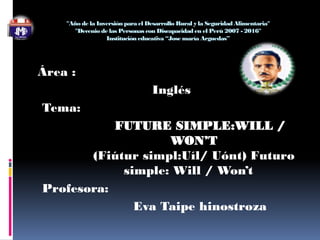
Cuando Dios dice “No
- 1. "Año de la Inversiónpara el Desarrollo Rural y la SeguridadAlimentaria" "Decenio de las Personas con Discapacidaden el Perú 2007 - 2016" Institucióneducativa “Josemaría Arguedas” Área : Inglés Tema: FUTURE SIMPLE:WILL / WON’T (Fiútur simpl:Uíl/ Uónt) Futuro simple: Will / Won’t Profesora: Eva Taipe hinostroza
- 2. CuandoDiosdice“No” Había una vez una niña pequeña que quería una muñeca. Cada tarde, se hincaba al decir sus oraciones, y a recordarle su deseo a Dios. “Por favor Dios, dame una muñeca para Navidad”. La Navidad llego y pasó, pero no había muñeca para la niña. El cumpleaños de la niña era a finales de enero, así que una vez mas agrego una petición especial cada noche para su muñeca. “Por favor Dios, no quiero otra
- 3. Seguía el día de la amistad, y las niña redobló sus esfuerzos. “No quiero dulces, Dios. Sólo una muñeca, por favor”. Su hermano que todo el tiempo había escuchado sus plegarias nocturnas, se agoto de oír lo concerniente a la muñeca. “¿Por qué no te das por vencida?”, le pregunto impaciente. “Dios no esta respondiendo a tus oraciones”, “Pero Dios si esta respondiendo a mis oraciones”, contesto la pequeña. “¿Cómo es posible que Dios este respondiendo a tus oraciones”, respondió su hermano. “La Navidad llego y paso, y recién fue tu cumpleaños, y todavía no tienes tu muñeca. Dios no esta respondiendo a tus oraciones.”
- 4. FUTURE SIMPLE:WILL / WON’T (FIÚTUR SIMPL:UÍL/ UÓNT) FUTURO SIMPLE: WILL / WON’T El tiempo Futuro simple se emplea justamente para hablar de acciones que se realizarán en el futuro (promesas). Se forma usando el auxiliar WILL seguido del verbo, y es igual para todas las personas. I Will be You Will be He Will be She Will be It Will be We Will be You Will be They Will be TO BE
- 5. I will be in London in two hours. (Ái uíl bi in London in tu auers.) Estaré en Londres en dos horas We will go to France next month. (Uí uíl gou tu Frans next mond.) Iremos a Francia el mes que viene. The president will visit the city (Da president uíl visit da citi.) El presidente visitara la ciudad Para realizar preguntas usando este tiempo se usa el auxiliar WILL seguido de la persona y luego el verbo: Will you go to France next year? (Uíl iú gou tu Frans next ier?) ¿Iras a Francia el año que viene? Will the president visit the city? (Uíl da president visit da citi?) ¿El presidente visitara la ciudad?
- 6. Para responder a las preguntas se usa Yes / No seguido de la persona y el auxiliar ( will para la respuesta afirmativa, won’t o will not para la negativa.) • Wil you come tomorrow? Yes, I will No will not / won’t (Uíl iú kám tumórrow?) (Yes, ái uíl) (No, uíl not/ uónt) ¿Vendras mañana? Si, yo vendré No, yo no vendré La forma negativa se compone del sujeto seguido por el auxiliar WILL NOT / WON’T y el verbo en infinitivo. • I will not / won’t como tomorrow. (Ái uíl not / uónt kám tumórrow.) No vendré mañana. • The children will not / won’t have classes next week. (Da children uíl not / uónt jav clases next uík.) Los niños no tendran clases la proxima semana Para realizar una pregunta especifica se usa la ``question word´´ y luego, se sigue el mismo método. Se responde usando la frase completa.
- 7. • Where will you go next month? (Uer uíl iú gou next mond?) ¿Dónde iras el proximo mes? • I will go to France next month. (Ái uíl gou tu Frans next mond.) Yo ire a Francia el proximo mes. Existen alguna expresiones para hacer referencia al futuro en el cual se realizaran estas acciones: Tomorrow (Tumórrou) Mañana The day after tomorrow (Da dei after tumórrou) Pasado mañana Next week (Next uík) La proxima semana Next year (Next mond) El proximo mes In 2014 (In tu tausend fortín) En el 2014
- 8. A. Reescribe las siguientes oraciones en tiempo futuro simple: 1. I travel to Spain ----------------------------------------------------------- 2.Tony isn’t ay school. ------------------------------------------------------------ 3.I’m too busy ------------------------------------------------------------ 4.We have a party tonight. ------------------------------------------------------------ 5.Sharon and Max study hard for the exam. ------------------------------------------------------------ 6.I answered the phone. ------------------------------------------------------------ B. Elige la opción más adecuada para responder a las preguntas: 1.Will you go to the cinema tomorrow? a.Yes, I will b.Yes, you are
- 9. 2.What do you think of that film? a. I will go b.I think it was good. 3.What are you doing? a.I’m reading a book b.I wrote a letter 4.When will the train arrive? a.Next week b.Last week
